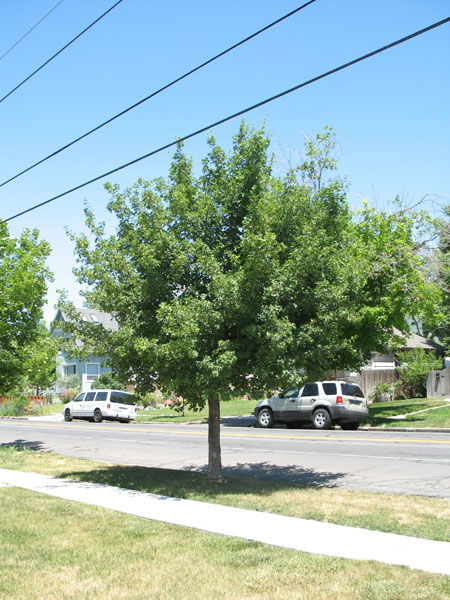Be a Good Tree Care Consumer
by Michael Kuhns, Extension Forestry Specialist (originally written for TreeUtah newsletter)
The other day a flyer was slipped into my door at home telling me that my maple tree had a fungus. The flyer went on to say that my tree could be cured with fungicide injections. In fact the company that placed the flyer indicated that they could inject my tree with fertilizers, insecticides, and antibiotics to cure a number of ills.
I called the person that placed the flyer and asked what fungus my tree had. He said it had anthracnose and probably Cytospora and that a fungicide injection could cure the problems. I pointed out that in fact my maple did not have anthracnose or Cytospora, but that it simply was chlorotic from a lack of available iron. Injections weren't warranted and probably wouldn't work even if the diseases were present. An iron injection might work but would only be a temporary fix. He stuck to his guns and said he got his injection materials from a certified tree pathologist, though further questioning indicated little knowledge about trees or the effects of repeated injections on tree health.
This experience serves as a reminder of the need to be critical and knowledgeable tree care consumers. This isn't just to avoid wasting money on needless treatments, but some treatments can actually do harm or cause you not to cure the real problem. Treatments involving unneeded fertilizers and pesticides also can cause environmental damage.
Though there are many good tree care companies and arborists in Utah, there also are some people who are simply selling a product. What bothered me about this experience was how little the person I talked to knew about trees and the products he was selling. I'm sure many of my neighbors also were told that their trees needed to be cured of non-existent problems.
Here are a few ways you can be a good tree care consumer;
- Ask the person about their qualifications. Being an ISA certified arborist is a good indication they are knowledgeable and they subscribe to a code of ethics.
- Avoid using people, companies, or products whose claims are too good to be true. No product or treatment can cure all ills.
- Learn about trees and tree care so you can critically assess recommendations and products.
- Remember, less is more. Other than water, trees have little need for repeated treatments with fertilizers, supplements, or other materials. Ask for specific reasons why a treatment is needed.
- Use company literature and web sites to learn more about services and products, but don't rely on their claims to judge effectiveness. Look for more information on web sites or ask experts who have no financial interest in whether or not you use a product.

Businesses also need to do their part;
- Persons selling tree care services or products need a thorough knowledge of trees, especially tree biology, and how to care for them. Attend educational workshops and consider becoming a certified arborist.
- Don't sell a product or service unless you know how (and if) it works.
- Be skeptical before adopting a product. Ask for and read published scientific literature (in journals like the Journal of Arboriculture) to see if a product or treatment really works and how it should be used. Company literature usually is not reviewed by independent experts outside the company.
- Avoid selling products or services that do not work or that do harm, even if there is a demand for them. For example, some people want their trees topped, yet it's bad for the tree and shouldn't be done. At least warn people if a desired treatment is unnecessary or harmful.
Trees occasionally need our care and we owe it to them, and ourselves, to provide that care correctly.

